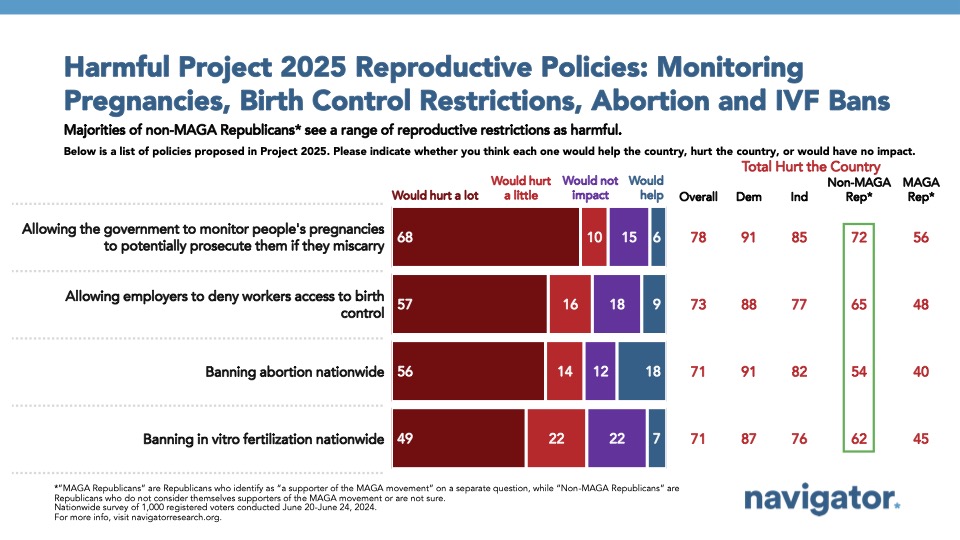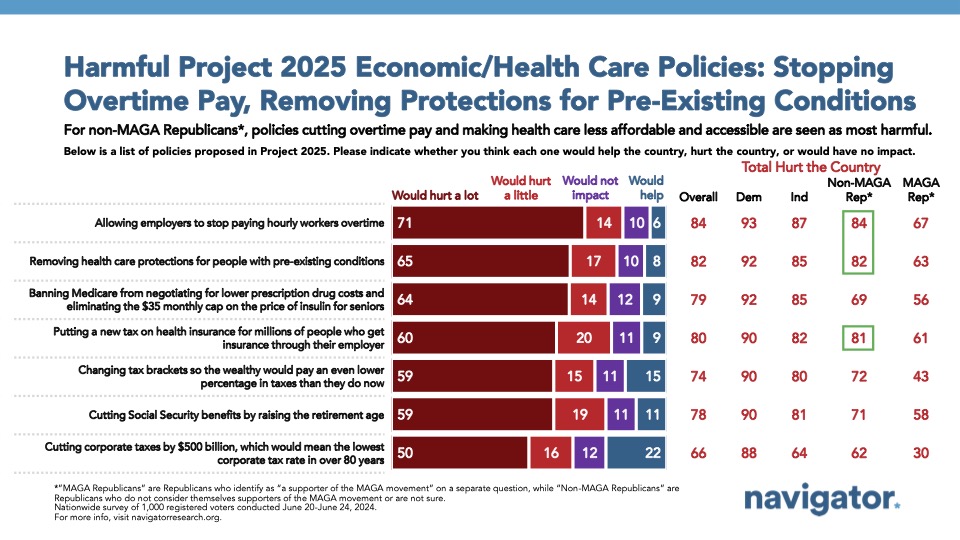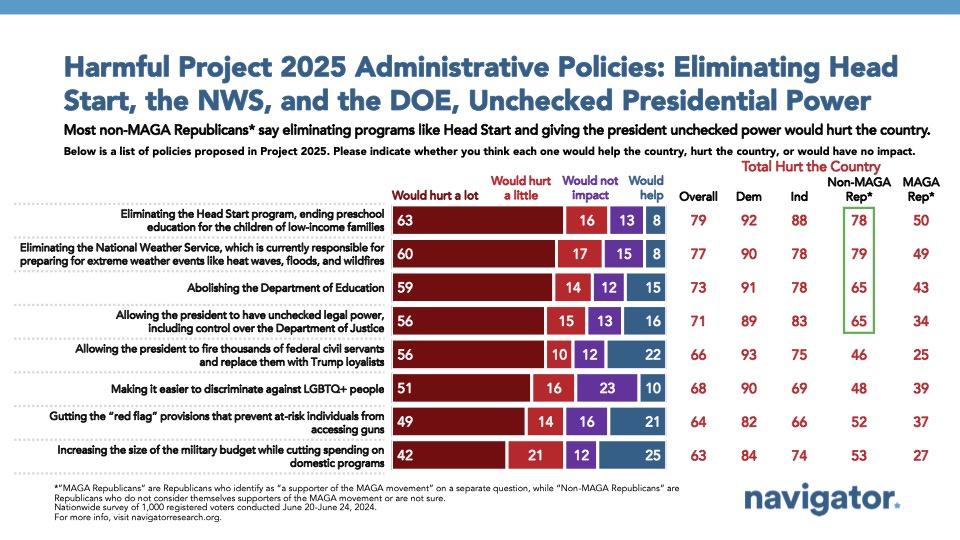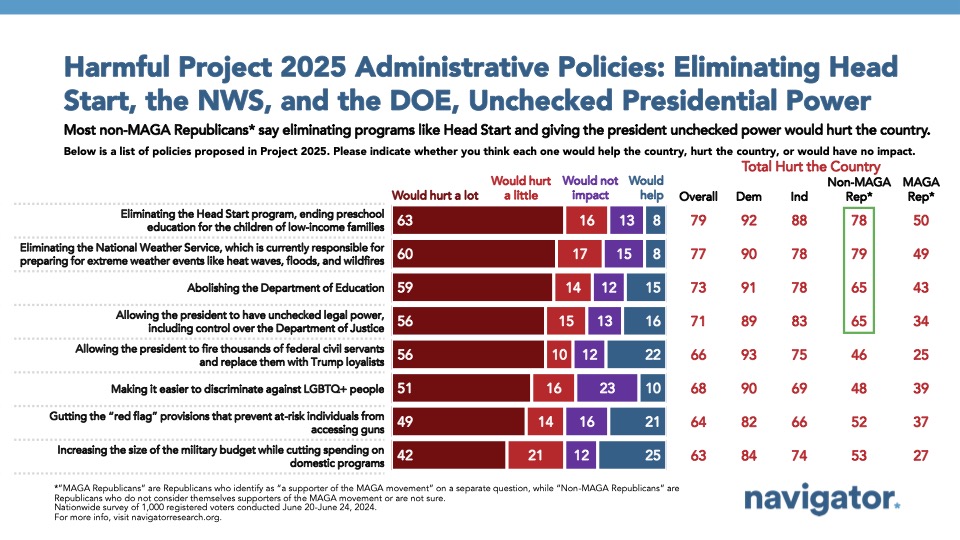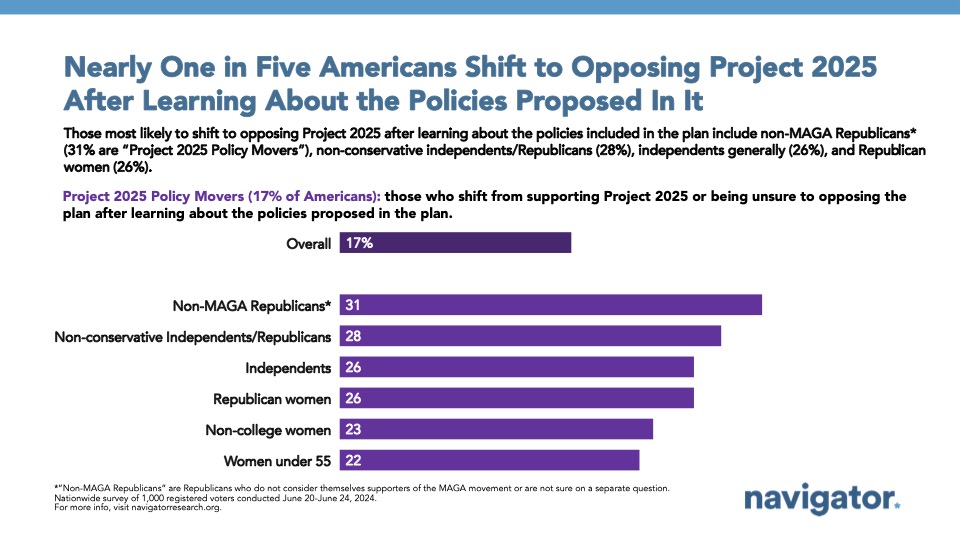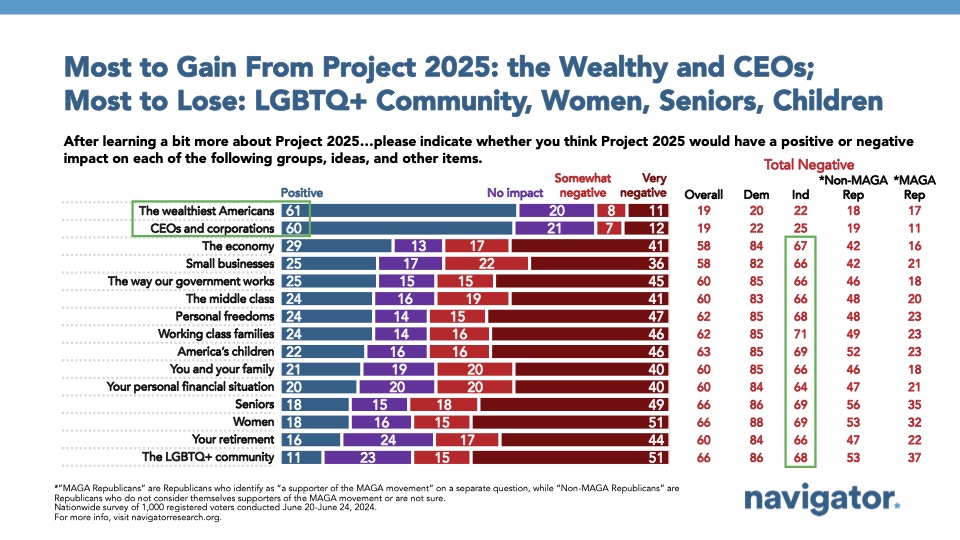Poll: Project 2025 Policies
This Navigator Research report contains polling data on how Americans view Project 2025, the conservative blueprint for a second Donald Trump presidency. This second release focuses on public reaction to specific policies and whether they would have a positive or negative impact on various groups.
A wide range of policies included in Project 2025 are seen as harmful to the country.
Americans oppose all the key elements in Project 2025, with the greatest concerns around health care, worker’s rights, and dismantling federal programs. Over four in five Americans oppose an array of policies proposed in Project 2025 such as “allowing employers to stop paying hourly workers overtime” (87 percent oppose, 84 percent find harmful to the country), with bipartisan opposition including over nine in ten Democrats (94 percent), and four in five independents and Republicans (81 percent each). Additionally, four in five oppose “allowing the government to monitor people’s pregnancies to potentially prosecute them if they miscarry” (85 percent oppose, 78 percent find harmful to the country). Other deeply opposed policies include:
- Removing health care protections for people with pre-existing conditions (83 percent oppose, 82 percent find harmful to the country);
- Eliminating the National Weather Service, which is currently responsible for preparing for extreme weather events like heat waves, floods, and wildfires (82 percent oppose, 77 percent harmful to the country);
- Eliminating the Head Start program, ending preschool education for the children of low-income families (81 percent oppose, 79 percent harmful to the country);
- Putting a new tax on health insurance for millions of people who get insurance through their employer (81 percent oppose, 80 percent harmful to the country);
- Banning Medicare from negotiating for lower prescription drug costs and eliminating the $35 monthly cap on the price of insulin for seniors (80 percent oppose, 79 percent find harmful to the country);
- Cutting Social Security benefits by raising the retirement age (80 percent oppose, 78 percent hurtful to the country); and,
- Allowing employers to deny workers access to birth control (79 percent oppose, 73 percent hurtful to the country).
- Reminder: A Navigator survey conducted in November 2023 found that cutting funding for Social Security and Medicare (81 percent oppose), nutrition assistance for vulnerable families (78 percent oppose), K-12 public schools (77 percent oppose), and health care, including Medicaid and the Affordable Care Act (74 percent oppose) are deeply unpopular, and more than seven in ten Americans want to see increased investment by the U.S. government in these programs.
Americans’ overall opposition to Project 2025 increases after reading about its specific policy goals.
Before being asked about the policies included in Project 2025, opposition starts at net -18 (31 percent support – 49 percent oppose), but, net opposition increases by 21 points after evaluating the specific policies in Project 2025 to net -39 (24 percent support – 63 percent oppose). A majority of independents oppose Project 2025 after reading about the policies included in it (net -59; 10 percent support – 69 percent oppose), a net 35-point increase in opposition. Only a plurality of Republicans remain supportive of Project 2025 (net +9; 46 percent support – 37 percent oppose), a net decline of 32 points compared to before reading about the policies.
- Among those unfavorable to both Biden and Trump, over three in four oppose Project 2025 after learning about the specific policies (net -68; 10 percent support – 78 percent oppose).
- Of the 17 percent of respondents who shift to opposing Project 2025 after being exposed to its policies, groups that are most likely to shift include non-MAGA Republicans (31 percent), independents (26 percent), Republican women (26 percent), non-college women (23 percent), and women under 55 (22 percent).
Three in five Americans say Project 2025 would benefit the wealthiest Americans, CEOs, and corporations.
Majorities of Americans believe Project 2025 would benefit the wealthiest Americans, CEOs, and corporations while having a negative impact on all other groups. From a list of 15 different groups, only two groups are seen by a majority of Americans as being positively impacted by Project 2025: the wealthiest Americans (61 percent) and CEOs and corporations (60 percent). A majority of Democrats (66 percent), independents (50 percent), and Republicans (56 percent) believe Project 2025 would positively impact the wealthiest Americans, and similar shares believe Project 2025 would positively impact CEOs and corporations (68 percent Democrats, 56 percent independents, and 56 percent Republicans).
- Two in three Americans believe Project 2025 would have a negative impact on the LGBTQ+ community, women, and seniors (66 percent for each). At least three in five Americans believe America’s children (63 percent), working class families (62 percent), and personal freedoms (62 percent) would be negatively impacted. Three in five Americans believe Project 2025 would have a negative impact on “you and your family” (60 percent), while only one in five Americans believe Project 2025 would have a positive impact on them and their family (21 percent).
- Over seven in ten women believe that Project 2025 would have a negative impact on women (72 percent), including nearly three in five who believe it would have a “very” negative impact (57 percent).
- A majority of Americans over the age of 65 believe Project 2025 would have a “very” negative impact on seniors (53 percent), part of a greater share of those over 65 who believe Project 2025 would have a generally negative impact on seniors (69 percent).

